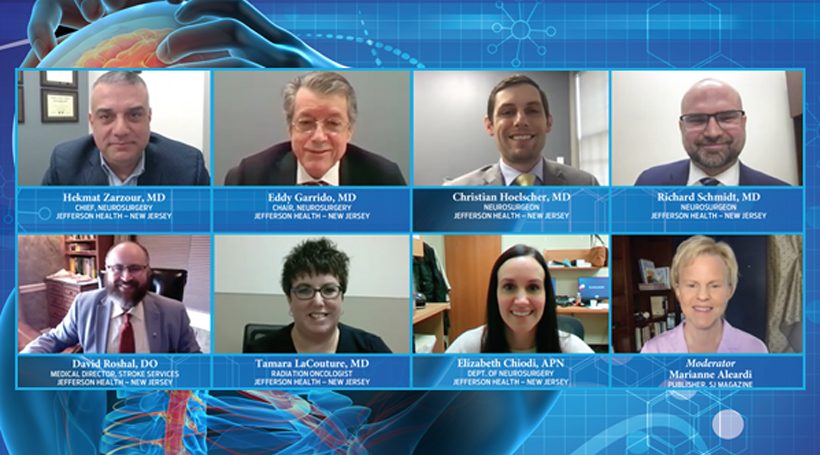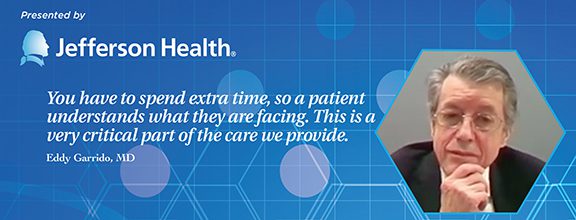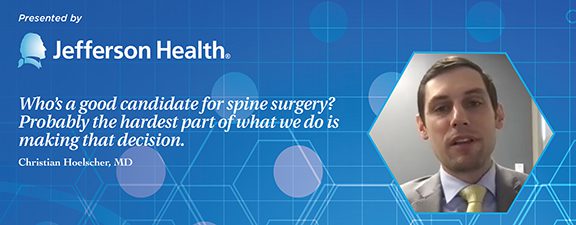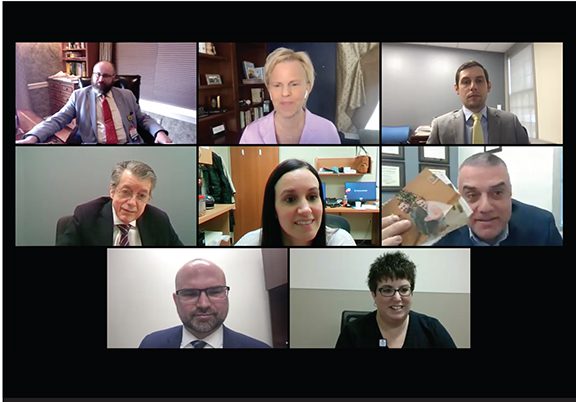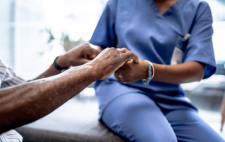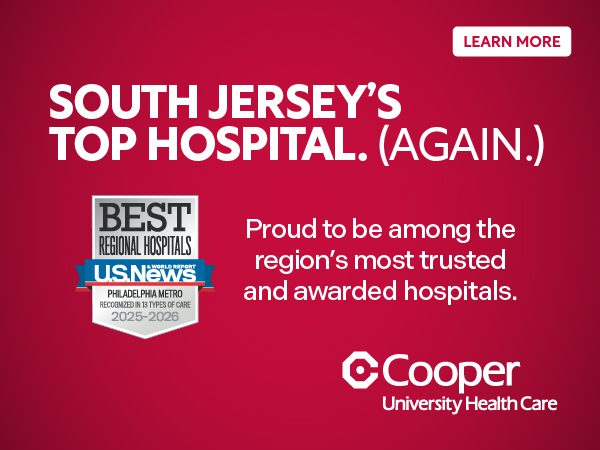Presented by

It is a complex topic. Very complex. So when we sat down with 7 healthcare providers from Jefferson Washington Twp., we had one request: Tell us your story in the simplest of ways. And they obliged, offering insight into work they recognize carries extremely high stakes but also, the best of rewards.
Participants:
Marianne Aleardi Moderator, Publisher, SJ Magazine
Hekmat Zarzour, MD Chief, Neurosurgery Jefferson Health – New Jersey
Eddy Garrido, MD Chair, Neurosurgery Jefferson Health – New Jersey
Christian Hoelscher, MD Neurosurgeon Jefferson Health – New Jersey
Richard Schmidt, MD Neurosurgeon Jefferson Health – New Jersey
David Roshal, DO Medical Director, Stroke Services Jefferson Health – New Jersey
Tamara LaCouture, MD Radiation Oncologist
Elizabeth Chiodi, APN Dept. of Neurosurgery Jefferson Health – New Jersey
Patient Misconceptions
A lot of people think aneurysms and strokes are devastating, life-ending occurrences that have no chance of meaningful recovery. The reality is there are things we can do to sometimes reverse what’s happened or mitigate the effects to the point that people can have significant recovery. It’s not uncommon to see patients who are very, very sick in the hospital, and we are aggressive with their management, and 3 months later they walk into the office and shake your hand.
Richard Schmidt
A lot of patients don’t understand that neurology and neurosurgery are separate fields. Neurosurgeons deal with all surgical problems of the nervous system, things that require an intervention of some kind. Neurologists are dealing with problems of the nervous system that generally are not procedural, things like the medical management of stroke, medical management of seizures, neuropathies. A lot of patients don’t understand that difference.
Christian Hoelscher
Patients don’t realize that not all hospitals are created equal in terms of stroke care. They don’t all carry the same designation with respect to the kind of care they provide for stroke patients. Comprehensive Stroke Centers, which is what Jefferson Health is in Washington Twp., can provide all modalities of stroke care. That’s why it’s so important to call 911 instead of driving yourself to a hospital. EMS can decide if, based on your symptoms, you need to go to a comprehensive stroke center.
David Roshal
Patients sometimes think neurosurgeons are scary. But that’s a misconception. They are not scary in any sense. You can approach them, ask them questions. They are very patient. They are kind, and they genuinely care.
Elizabeth Chiodi
Explaining Complex Care
Our role is to make sure we answer patients’ questions. I tend to provide a lot of written information because our care is individualized to each patient. We want to ensure that in this complex world, patients truly understand the implications of their diagnosis, as well as the implications of their treatment and beyond into survivorship.
Tamara LaCouture
A patient who has been diagnosed with a brain tumor, obviously, comes to the office scared, and they usually can’t focus on what’s going on. You have to spend a lot of time and, hopefully, there are family members there. Before they leave, you ask if they understand the risks and benefits of the treatment. You spend that extra time so when they leave the office, they have a good understanding of what’s going on.
Eddy Garrido
When I am evaluating a patient in the hospital with an acute stroke and we have to make a decision about treatment, I have to make the patient understand what the benefits are, so he can weigh it against the risk. A very helpful way of presenting this information is visually – so we provide patients a visual way of understanding the risk benefit.
David Roshal
Relationship With Patients
I’m one of the nurse practitioners here, so I see patients pre- and post-operative with the attending physicians. We also spend a lot of time with the patients ourselves. It’s nice to develop a relationship with them and understand what brought them in and what’s going on. You get to know them. That can be difficult, though, if we don’t have a favorable outcome.
Elizabeth Chiodi
If anyone comes to my office and we’re talking about surgery, I always tell them they should not feel bad about getting another opinion. They might feel better hearing the same thing from somebody else. Or conversely, if they hear something different, they can pause and think and maybe even get another opinion. They need to feel comfortable with what’s going on.
Christian Hoelscher
Medical Advancements
Endovascular treatments have had excellent progression. It’s been groundbreaking. We can now very aggressively treat stroke in a minimally invasive way, and the outcome for the patient is really, really excellent.
Hekmat Zarzour
There’s such tremendous innovation. Think of the forefathers of neurosurgery. Basically, everyone told them, “You can’t operate on the brain or the spinal cord. You’ll kill everyone.” And look where we are now. I’m very excited to see when I’m retiring, what the young doctors coming out of training will be doing with things that are not possible today.
Christian Hoelscher
If someone is having a stroke, where one of the big vessels that supplies a large area of the brain gets blocked – so a blood clot prevents blood flow from getting to that part of the brain – we can actually thread a catheter from the wrist or groin up toward that blockage. We deploy a device that then pulls the clot out of the brain. This has completely changed how we deliver care to stroke patients, and outcomes have improved astronomically.
Richard Schmidt
One major advancement made in the past decade, and certainly within the last few years because of the pandemic, is utilizing telemedicine. Before telemedicine, it was difficult to get a neurologist very quickly to the bedside, especially in the context of acute stroke. Now with our telemedicine program, we can get to the bedside in under 5 minutes to evaluate the patient. We are essentially using a robot – it kind of looks like the robot from “The Jetsons,” where you have a doctor that beams in on the screen. The robot is able to zoom in on the patient, and we can change the direction of the robot and focus on particular areas of the body. This has tremendously improved acute stroke care delivery in the hospitals.
David Roshal
The radiation we deliver has been relatively unchanged over the years, but the major improvement has been how we deliver it – the accuracy of the technology lets us provide personal treatment plans for our patients.
Tamara LaCouture
Losing a Patient
You are with a patient in every decision. You’re part of the process. They call you, they ask you questions. In the last 2 years of their life, they will call you with any alternative treatment, and you try to guide them. You want to save them. You want to improve their outcome. You want to promise they will be at the wedding of their daughter. They ask, and you say yes. Recently I promised somebody that he will see the birth of his son. And he did. But when the end is the patient dying, you feel the failure.
Hekmat Zarzour
I have a huge responsibility to make sure the patient and their family understand the goals of their care and to guide their active care. But I also have a responsibility to guide the transition to supportive care for a patient who is not going to be cured of their cancer. That’s an important role we have. It’s also a huge honor.
Tamara LaCouture
We live with this as a part of our everyday lives. It’s a routine discussion on my end to talk a family through what it means when their family member has a ruptured aneurysm and their chance of overall survival is very tenuous. But I see that as a privilege of our profession to be so close to the most important moment in someone’s life. It’s our duty to help guide them. I think it takes a very special kind of person to do what we do.
Richard Schmidt
Healthy Lifestyle Habits
Avoid obesity. That’s the mother of most problems. That’s going to lead to problems associated with the nervous system, particularly with the back and stroke.
Eddy Garrido
If you smoke, quit. If you don’t smoke, don’t start. It does terrible things to your blood vessels, which increases your risk of stroke. It increases your risk of surgical complications. It is just one of the absolute worst things you can do to your body.
Richard Schmidt
To help prevent needing to come to see us with a spine problem: Control your weight, do not smoke, work out, drink water.
Hekmat Zarzour
Care During Covid
In the beginning, we saw a tremendous decrease in the number of patients with neurological problems, because they would not come to the hospital. There have also been patients with cancers who had a delay in diagnosis because they wouldn’t come in with symptoms. We saw the shutting down of elective procedures, which also negatively impacted the diagnosis of cancers as well as other diseases. But things have improved, elective procedures are happening, and we’re seeing kind of the return to normalcy, which is a good thing.
David Roshal
There were 2 parts: Social and medical. Social: People were afraid to come to the hospital, so we had delayed diagnosis, delayed treatment. The medical part is the complication of Covid and how it affected patients. We saw young patients with strokes, which we did not have pre-Covid.
Hekmat Zarzour
In radiation oncology, we never stopped. We continued to treat patients who had been diagnosed and needed treatment. We had to adapt our technology and our process to make sure we kept patients safe. We also took care of patients who were Covid positive, who had cancer and needed therapy.
Tamara LaCouture
I remember when we treated the first patient with Covid who had a stroke. I remember that very vividly. It was the first time, so we were like, “Oh my gosh, this patient is Covid positive. We have to do something right away, right now, for this patient.” So everyone just rolled up their sleeves and said, “Alright, let’s get going.” That mentality in the entire medical community really showed everyone’s true colors. It showed what we’re capable of.
Richard Schmidt
In the beginning, we weren’t sure how to approach things. Should we see the patient? Some people were saying we shouldn’t, but we always went and saw the patient. We needed to see them to evaluate what kind of deficit they may have and determine how we could help them. So things didn’t change so much on my end, but for the physicians, there was a different preparation for the OR because they were at a much higher risk.
Elizabeth Chiodi
What they like about their jobs
The work we do gives us a perspective on life. I try to remember that during my downtime, I want to be present with my family and make all those wonderful memories. That’s a critical part of who I am.
Tamara LaCouture
It hits all the high points in what you could want for any job. It’s extremely stimulating intellectually. We’re dealing with complex problems and trying to find solutions for them. When you’re operating, you perform complex, technical tasks. You’re focused and you get in that flow state for hours at a time. We help people in a very profound way. I couldn’t imagine myself doing anything else.
Richard Schmidt
The best is when you spend 6 or 8 hours removing a brain tumor and you come out of the OR knowing this patient is going to have a different life now. He gets to be a normal person. That makes your day, and the euphoria stays with you for a number of days.
Eddy Garrido


